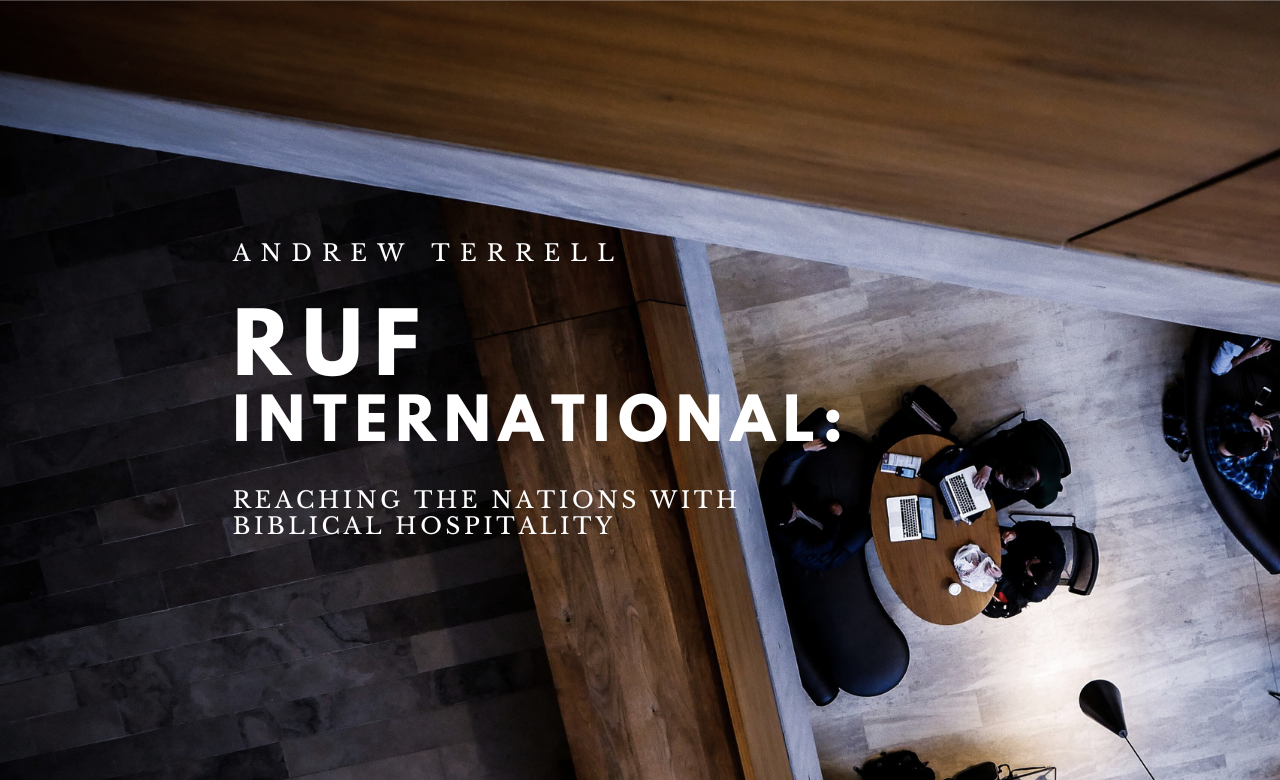There are over one million international students living in the United States who represent every major cultural and religious background in the world. The vast majority of these students will never be welcomed into the homes of local Americans during their time here.
I recently read about a Saudi Arabian student preparing to return home after several years at an American university. The student left behind a full suitcase with his roommate. “What’s this?” the roommate asked. “It’s full of the gifts I brought to give Americans when they welcomed me into their homes,” the student replied, “but no one invited me.” As you may know, Saudi Arabia is less than one percent Christian. But what many do not realize is that this country, the birthplace of Islam, also sends more than 20,000 of its most capable students to the U.S. every year, on the university campuses right in our backyards. Imagine if the Church welcomed them in the name of Jesus. How might the story of the student with the suitcase be different? How might Saudi Arabia itself one day be different?
Rev. Chad Brewer, the National Coordinator of Reformed University Fellowship International (RUF-I) put it this way:
“There has never been a time in history when the nations of the world have sent their best and brightest to another country to be educated as is currently happening in the United States. This is an unprecedented opportunity for the church.”
Making the most of this “unprecedented opportunity” lies at the core of the mission of RUF-I. We exist as a ministry of the PCA to welcome international students with biblical hospitality, to explore Christianity and the Bible with them, and to equip them as kingdom ambassadors to return to wherever God sends them across the world. We are on 23 campuses around the U.S. from San Diego to New York City, working in partnership with local presbyteries and churches to carry out this mission. In other words, RUF-I seeks to welcome the foreigner among us (Lev 19:34) and to make disciples of all nations (Mt 28:19).
___
As a young married couple, my wife and I started down the cross-cultural ministry path with a three-year stint in Madrid, Spain where we worked in church planting and college ministry. We then moved to New York City in 2015 so that I could begin my seminary studies at the new RTS campus there. While a student myself, RUF gave me the opportunity to establish a new ministry to international students at Columbia University. By God’s grace, that ministry grew into something that I was able to carry on past seminary and ordination.
Reflecting on the past eight years working among international students at Columbia, two key images rise to the surface, that of a funnel and a bridge.
First, I have come to see that the university campus is like the narrowest part of a funnel. The Church can (and should) send people far and wide to reach the nations with the gospel. But to be on the university campus is to stand in an incredibly unique hub where God gathers the nations together and then disperses them back out across the world. I am convinced that there is no more strategic place for the Church to go than to stand, with open arms, in this narrow point of the funnel.
Secondly, RUF-I is designed to be a two-way bridge between this cross-cultural center and local churches. In one direction, the Church moves toward the campus as church partners get to jump straight into the deep end of diverse evangelistic opportunities. In the other direction, international students from every religious background move toward the Church: they experience biblical hospitality while digging into biblical texts and hearing the gospel proclaimed.
This brings us to present-day Nashville, Tennessee. This summer, my family and I relocated to Nashville to establish a new chapter of RUF-I at Vanderbilt University. Some have called Nashville the “belt buckle” of the Bible Belt, and perhaps there is an undertone of criticism towards the cultural Christianity you can find here. But it’s also hard to deny the fact that Nashville is almost bursting with fast-growing, gospel-proclaiming churches. And in the geographic and cultural center of Nashville sits the historic Vanderbilt University, with around 2,000 international students from over 100 countries. If we only include the PCA, there are ten churches within just a five-mile radius of campus. As I considered starting RUF-I here, I began to wonder: what if God had equipped me to be the bridge-builder between this city full of vibrant churches and the world’s future leaders on campus at Vandy? And since moving here, I have been almost overwhelmed with the enthusiastic desire from these churches to partner with RUF-I.
“We are incredibly grateful for the opportunity to partner with RUF-I at Vanderbilt. It’s encouraging for our church to see God’s work among the nations in our own backyard, while we grow in a vision of His kingdom that is richer and wider than our own cultural experiences.”
-Rev. Chad Scruggs, Senior Pastor of Covenant Presbyterian Church
___
The goal of RUF-I is to welcome, explore, and equip international students, in partnership with the local church. That the Church should be a welcoming place probably is no surprise; but what exactly do the Scriptures have to say about the practice of hospitality for God’s people? The Old Testament is surprisingly clear, with dozens of commands to welcome ethnic and cultural outsiders to a radical degree. Perhaps the most well-known is Leviticus 19:34: “You shall treat the stranger who sojourns with you as the native among you, and you shall love him as yourself, for you were strangers in the land of Egypt…” We were all once estranged and wandering, but God, the Great Host, has made a new home for us in himself. In other words, welcoming outsiders is a direct application of the gospel.
In the New Testament, Paul even lists this stranger-welcoming among the requirements for church leaders, in both 1 Timothy 3 and Titus 1. He says that church overseers must be philoxenon. Though translated as “hospitable”, the Greek word is much more precise: philos, meaning affectionate love, and xenon, meaning stranger or foreigner. In other words, biblical hospitality is not hosting Martha Stewart parties for friends but radical love for the foreigner, or philoxenia. And in Paul’s view, philoxenia is not a bonus quality for Christians but a key mark of Christian character and maturity
In RUF-I, “welcoming” international students means creating a place where they can belong before they believe. This can look as wide-ranging as inviting a new East Asian student out for bubble tea, to a local church hosting an October “pumpkin carving party” for a large group to experience this funny tradition for the first time. One of the best examples of this in RUF-I is Thanksgiving, whether it is a large group meal for more than 100 students, or an individual family hosting just one or two additional students in their home. Last year, after a local family in NYC invited a South Asian friend from a Hindu background to join them for Thanksgiving, the student sent me this message:
“I went to Carol and Mitch’s home and joined their family dinner. They are the best hosts I have ever known. They are so friendly and warm. Thanks so much for making my first Thanksgiving so special.”
It is hard to overstate how meaningful an experience like this will be for a student who is isolated from their family and far from their home culture during the holidays. And as our own country becomes increasingly de-churched and un-churched, I have to wonder if this approach to welcoming “outsiders” applies to more than just internationals. Steve Childers, RTS professor and President of Pathway Learning, has said that “hospitality is the key to 21st-century evangelism.” In a culture in which fewer and fewer people even consider going to church as an option, evangelism will have to mean more than giving gospel presentations. The American church actually has to learn creative ways to help people meaningfully connect with church community before they ever believe anything about God or the Bible. People need to “taste and see” before they “know”; they need to belong before they believe.
Of course, gospel hospitality without gospel proclamation won’t lead to faith in Christ. But gospel proclamation without gospel hospitality probably won’t either. The heart of RUF-I is trying to connect these two practices for internationals, and to invite the local church to come alongside us as we “explore.” One common approach to this in RUF-I is a weekly Dinner and Bible Discussion style large group event. At these gatherings, we share a meal among staff, church volunteers, and students, and then discuss a passage from the Bible together.
A few years ago, a student from East Asia showed up to our Dinner and Bible Discussion after seeing our flier in a building on Columbia’s campus. After her first few months attending, I asked her what she was experiencing in RUF-I:
“In my country, all of our religious stories are about people coming to the gods only when they want something from them. But now, after meeting weekly to explore the Bible, I’ve noticed how every story somehow points to God’s love for us.”
Much more could be said about the beauty of these Dinner and Bible Discussions, but I am reminded of a couple of lessons we learn from Acts 8, when Philip has his own surprise xenon encounter with the Ethiopian Eunuch. First, God is always at work in unpredictable ways. Secondly, when we open the Bible with people and help them to see Jesus on every page, surprising transformation can and will happen.
Lastly, in RUF-I we aim to do more than welcome and explore; we hope to equip students as ambassadors for Christ as they spread out across the world. During COVID restrictions, I had the great privilege of participating in the baptismal service of a former RUF-I student over Zoom back in his home country. He was baptized in one of the largest cities in Asia in an underground church, in the bathtub of his covert pastor. Now he is an up-and-coming screenwriter with the holy ambition to write redemptive TV content for a country of over one billion people.
“The university is a clear-cut fulcrum with which to move the world… more potently than by any other means, change the university and you change the world.”
-Charles Habib Malik, Lebanese Christian who served as the Secretary-General of the U.N.
The world’s rising engineers, entrepreneurs, and economists are gathered here. The politicians, physicians, and church planters that will lead the nations into the future happen to live just a few miles away from you. If the American church owns this unprecedented opportunity to welcome, explore, and equip internationals with the gospel, who knows what God will do? I pray that we will start right here in Nashville.
Originally from the Southeast, Andrew has spent most of his adult life far from home in both Spain and New York City. In the summer of 2023 Andrew moved back south to Nashville to establish a new RUF International ministry at Vanderbilt University, after spending eight years in the same role at Columbia University. Andrew holds degrees from the University of Georgia and Reformed Theological Seminary, and is an ordained minister in the Presbyterian Church in America. When he’s not on campus with international students, you can find Andrew reading a book, walking in the woods, or alongside his wife Olivia chasing their three young boys around the backyard.

